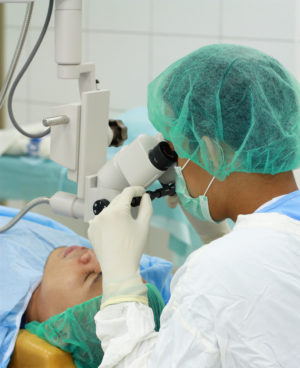Although cataracts were once a leading cause of blindness, in developed countries today, the condition can be corrected in a matter of minutes. Your surgeon will simply remove the old, clouded lens and replace it with an artificial intraocular lens (IOL). Cataract surgery poses few risks, and it can have enormous benefits for your quality of life. However, in some cases, you may suffer from posterior capsule opacity (PCO) after cataract surgery. Fortunately, through routine eye exams, we can detect cloudiness in your eye.Then, Dr. Paul Chen can correct PCO with a YAG capsulotomy at our San Diego practice.
What Is Posterior Capsule Opacity?
 The natural lens inside your eye is surrounded by a thin capsule. During your cataract surgery, your doctor will preserve most of these tissues. In some cases, epithelial cells will start to grow on the capsule. This condition, known as posterior capsule opacity, can cause blurriness and gradual vision loss. Like cataracts, however, the condition only affects one part of your eye. Proper care will restore your lost vision.
The natural lens inside your eye is surrounded by a thin capsule. During your cataract surgery, your doctor will preserve most of these tissues. In some cases, epithelial cells will start to grow on the capsule. This condition, known as posterior capsule opacity, can cause blurriness and gradual vision loss. Like cataracts, however, the condition only affects one part of your eye. Proper care will restore your lost vision.
How a YAG Capsulotomy Works
A YAG laser capsulotomy is a quick, pain-free procedure to address PCO. First, Dr. Chen will administer eye drops to dilate your pupils. Then the advanced YAG laser will create an opening in the cloudy portion of the capsule, allowing light to pass through. At the same time, the laser energy will not affect the surrounding tissues. YAG laser capsulotomy is highly effective. You will not feel anything during the procedure, and risks are relatively low. You may experience some mild eye irritation after your capsulotomy, but you can usually control this discomfort with prescription eye drops. You may also notice floaters in your visual field for a few months after the surgery. This is normal and typically nothing to worry about. Nevertheless, if the floaters come on very quickly, or if they suddenly increase, you should contact our office immediately.
Are You Suffering from PCO?
In some cases, you may not receive a posterior capsule opacity diagnosis until your vision starts to decline. Although vision loss is reversible, it can still affect your quality of life until you receive appropriate care. For this reason, it is important to schedule routine checkups, especially following cataract surgery. Dr. Chen can often diagnose PCO during a slit lamp exam. This test will provide your doctor with a 3-D view of your eye, including your lens, cornea, iris, and vitreous gel. After dilating your pupils, you will look into a light while Dr. Chen examines your eye with a microscope. In some cases, he may also take photos of the inside of your eye. A slit lamp exam involves no discomfort, although the dilating eye drops may cause some light sensitivity and make it difficult to focus. Therefore, you should find someone to drive you to and from your appointment.
Schedule an Eye Exam Today
When you make routine visits to our office, we can schedule a YAG capsulotomy before you experience severely blurred vision. Contact our office today to book your appointment.



